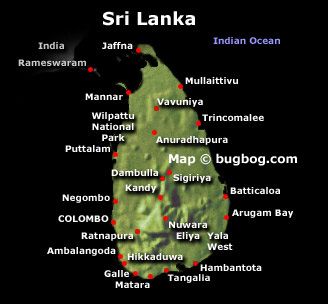
Publisher:
Bonnie King
CONTACT:
Newsroom@Salem-news.com
Advertising:
Adsales@Salem-news.com

~Truth~
~Justice~
~Peace~
TJP
Nov-01-2011 14:39

 TweetFollow @OregonNews
TweetFollow @OregonNews
A Beautiful Island - its Bloody Past and Potential Future
Salem-News.com“Unfortunately Sri Lanka has a long history of failed attempts at investigating abuses and addressing the past, so it’s hard to be optimistic” - Alan Keenan, Senior Analyst and Sri Lanka Project Director
 Map of Sri Lanka |
(COLOMBO) - The island of Sri Lanka, known for its stunning and diverse nature, but also for its ethnic violence, is now facing the challenge of overcoming its bloody past and focusing on development and stability.
“In the 1950s and 60s Sri Lanka was hailed as a model developing country, with functioning democracy, working institutions and good economic growth”, says Alan Keenan, Senior Analyst and Sri Lanka Project Director for the International Crisis Group (ICG).
What happened?
In a country of just 20 million, with three major languages (Sinhala, Tamil and English) and four major religions, ethnic tensions, controlled but exacerbated by colonial rule, broke out soon after the country declared independence in 1948 just after the Second World War. “In anticipating independence politicians from the different ethnic groups had their own aspirations and ideas of what the country should look like”, says Keenan, “and within a decade after Britain’s departure, ethnic conflicts began to dominate political life. By the 1970s there was worsening anti-Tamil violence”, he continues.
In 1983 a fully-fledged war broke out between various Tamil militant groups, eventually dominated by the Liberation Tigers of Tamil Eelam (LTTE), and government forces. A civil war that left over 100,000 people dead and displaced hundreds of thousands of others, lasted until government soldiers finally defeated the LTTE in 2009.
As the war ended it was time to rebuild the country and restore its battered rule of law.
“It’s important to realize that although Sri Lanka has suffered ethnic tensions, violence and civil war for the last 30 years, it is not a failed state,” Keenan of the ICG says. “It has a good base of educated, middle-income people, but its institutions, especially the police and judicial system, have been badly damaged, and the political dynamics are not free or truly democratic”, he continues.
For many the way forward would be to create a truth and reconciliation commission, modeled on the successful model in post-apartheid South-Africa. The Sri Lankan Government has indeed appointed a “Lessons Learnt and Reconciliation Commission”, but according to several NGOs, among them Amnesty International and ICG, the commission is deeply flawed. “The current commission is not independent, and unfortunately its limited mandate suggests it was designed primarily as a way for the Government to dictate its own version of what happened”, Keenan says. He argues that for such a commission to be effective “it would need to have independent commissioners, nominated by different political parties. It would also need witness protection, a wider mandate, and the ability to investigate abuses committed by all sides to the conflict, from which all communities have suffered”.
The chief obstacle, according to Keenan, is the lack of political will from the government. “We need an open political structure in Sri Lanka. The president and his two brothers control all the most important ministries and around 75 % of the national budget. This is not a positive scenario for addressing the damage done to Sri Lanka’s political institutions from decades of war and terror. Equally worrisome, there are no signs the government is especially interested in addressing the political marginalization and grievances of minorities by including Tamils and Muslims equally in political life, not only nationally but locally. And if they are not interested in correcting the mistakes of the past, their policies risk sowing the seeds of future conflict,” Keenan argues.
Are there any reasons to be optimistic?
“Unfortunately Sri Lanka has a long history of failed attempts at investigating abuses and addressing the past, so it’s hard to be optimistic,” Keenan says. “But we have to remember that Sri Lanka has a lot of potential, should the government allow it to develop through open and democratic debate” he concludes.
Source: United Nations Regional Information Centre (UNRIC)
 |
 |
 |
 End Israel's Unwarranted Murder of Kids |
Articles for October 31, 2011 | Articles for November 1, 2011 | Articles for November 2, 2011

Quick Links
DINING
Willamette UniversityGoudy Commons Cafe
Dine on the Queen
Willamette Queen Sternwheeler
MUST SEE SALEM
Oregon Capitol ToursCapitol History Gateway
Willamette River Ride
Willamette Queen Sternwheeler
Historic Home Tours:
Deepwood Museum
The Bush House
Gaiety Hollow Garden
AUCTIONS - APPRAISALS
Auction Masters & AppraisalsCONSTRUCTION SERVICES
Roofing and ContractingSheridan, Ore.
ONLINE SHOPPING
Special Occasion DressesAdvertise with Salem-News
Contact:AdSales@Salem-News.com
Salem-News.com:



Terms of Service | Privacy Policy
All comments and messages are approved by people and self promotional links or unacceptable comments are denied.
[Return to Top]
©2026 Salem-News.com. All opinions expressed in this article are those of the author and do not necessarily reflect those of Salem-News.com.